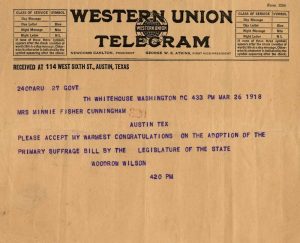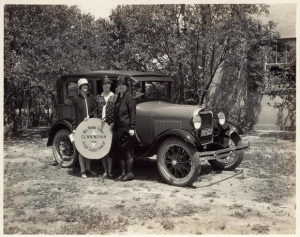From the Texas State Library and Archives Commission
Minnie Fisher Cunningham
Born: 1882 in New Waverly, TX
Died: 1964 in New Waverly, TX
Noted For: A key player in Texas and national politics, Minnie Fisher Cunningham is noted as the first executive secretary for the National League of Women Voters, as a founding member of the Woman’s National Democratic Club, and as the first woman from Texas to run for the U.S. Senate. She was also the first woman at the University of Texas Medical Branch in Galveston to earn a graduate pharmacy degree.
“We rose to leave the gallery of the House, and when the men saw us they all stood up and gave us a perfect ovation, cheering for some minutes and calling for a speech.” — Minnie Fisher Cunningham’s account of the passage of the Texas primary suffrage bill in 1918.
The Lone Star State certainly has no shortage when it comes to women who know how to get things done, not to mention women with grit, fierce determination, and vision.
Those Texas women who have shaped history owe a nod of recognition to Minnie Fisher Cunningham, one of the most prominent suffragist leaders of the 20th century and a “founding mother” of Texas women’s political and social activism.
Early activism…
Determination and perseverance, two of Minnie’s signature traits, developed as important themes early in her life.
Although her parents hailed from wealthy families, their own fortunes plunged in the wake of the Civil War. To survive, they moved in with Minnie’s grandparents and earned income by selling produce to railroad workers.
Minnie didn’t let her family’s setbacks get in her way. After earning a state teacher’s certificate at the age of 16, she gained admission to the University of Texas Medical Branch in Galveston, where she became the school’s first woman to complete a Graduate of Pharmacy degree. In later years, Minnie said that the gender-based wage inequities she observed as a working pharmacist (a career she pursued before she married and entered politics) motivated her decision to join the battle for equal voting rights for women.
While the injustice of unfair wage practices fueled her determination to win suffrage, Minnie’s inclination towards political leadership may have been influenced by her father, who had served in the Texas legislature prior to the war, as well as her mother, who teamed up with Minnie to lead fundraising efforts for the victims of the Galveston Hurricane of 1900.
On the frontlines of the battle for the vote…
In the years running up to ratification, Minnie became involved with a number of social issue and political organizations, including the Women’s Health Protective Association, the Galveston Equal Suffrage Association, and the Texas Woman Suffrage Association (later the Texas Equal Suffrage Association). She quickly rose to the leadership ranks of the suffrage movement on the Texas and national stages, honing her skills and reputation along the way as a sought-after writer, speech maker, deal broker, and fundraiser.
Minnie also played critical roles in the 1915 effort to amend the Texas constitution to codify voting rights for women (the amendment ultimately failed, but helped raise the profile of the state suffrage movement)—as well as the successful effort to impeach and unseat Governor James “Pa” Ferguson (a political foe who vigorously opposed votes for women) and replace him with cause-friendly William P. Hobby, who would eventually sign Texas’s suffrage bill into law.
She is also credited with leadership that led to the passage of a bill allowing (white) women to participate in the 1918 primary election, the first time that Texas women were allowed to cast a vote.

On the left: Congratulatory cable from President Woodrow Wilson. From the University of Houston Digital Library: Women’s Archives, Minnie Fisher Cunningham Papers.
Post-amendment activism…
As the dream of women’s suffrage edged toward reality, the need to educate women about the exercise of their new voting right, as well as how to take a larger role in public affairs, quickly became apparent. The result was the 1920 formation of the League of Women Voters [link to Spotlight 40, the League spotlight], a national organization that appointed Minnie as its first executive secretary.
Given her extensive contributions to the suffrage movement, Minnie could have easily justified retiring from public life once the amendment was adopted. Instead, she carried on with unflagging energy until her passing 44 years later, becoming the first woman from Texas to run for the U.S. Senate and also running for governor.

On the left: Minnie on the campaign trail. From the Austin History Center General Collection.
Additionally, the famous suffragist advocated for farm and labor unions, helped pass a federal food law that promoted better nutrition, and championed a law providing federal funding for child and maternity care. She also fought for the passage of the Cable Act, which reversed an earlier law that stripped women of their citizenship if they married non-citizen men.
Minnie was also a Franklin D. Roosevelt ally (FDR famously nicknamed her “Minnie Fish”) who supported the New Deal; her work in this area led to her involvement with the Woman’s National Democratic Club and the Democratic Women’s Advisory Committee. In her last years, Minnie ran and financed a county-based election campaign for John F. Kennedy before she passed away in 1964.
As a woman leader in Texas, Minnie’s contributions—and her impact— cannot be overstated. “Her forty years of activism helps fill in the still-emerging narrative of female political activism between the demise of the first women’s movement after 1920 and the rebirth of feminism in the 1960s.” —”Minnie Fisher Cunningham: A Suffragist’s Life in Politics”.
Additional Reading:
“Minnie Fisher Cunningham: A Suffragist’s Life in Politics” by Judith N. McArthur and Harold Smith
“Women and Texas History: Selected Essays” by Fane Downs, Nancy Jones, Nancy B. Jones
Minnie Fisher Cunningham Papers—The University of Houston







